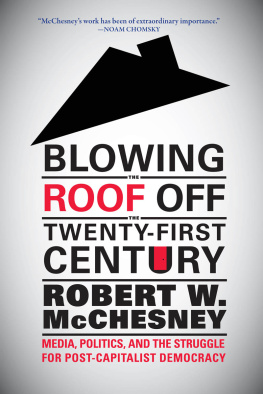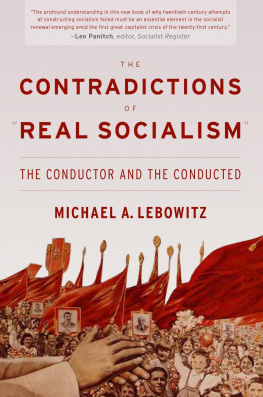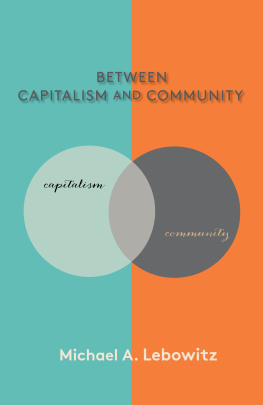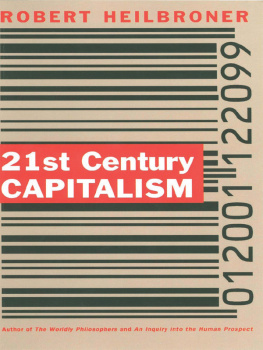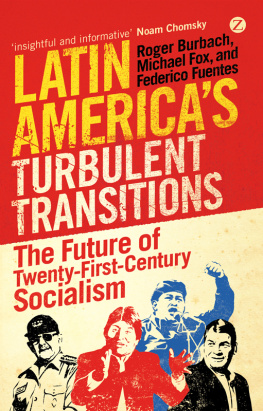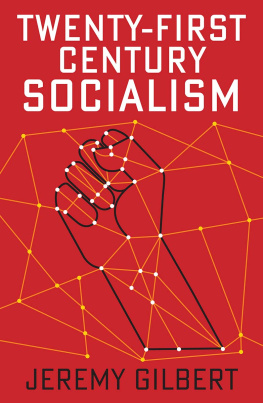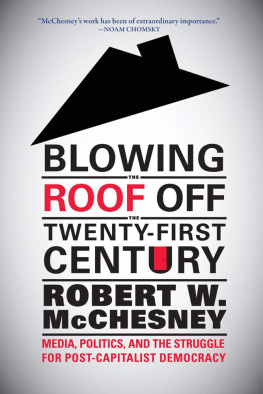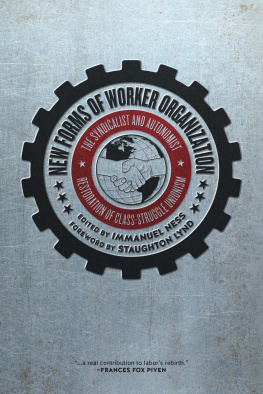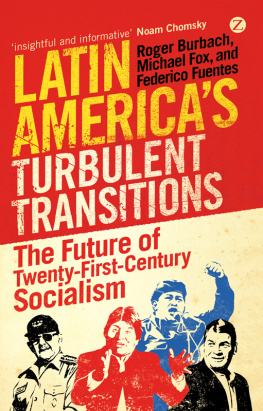Build It Now:
Socialism for the Twenty-first Century
Build It Now:
Socialism for the Twenty-first Century
Michael A. Lebowitz

Copyright 2006 by Michael A. Lebowitz
Library of Congress Cataloging-in-Publication Data
Lebowitz, Michael A.
Build it now : socialism for the twenty-first century / Michael A. Lebowitz.
p. cm.
Includes bibliographical references and index.
ISBN 1-58367-145-5 (pbk. : alk. paper) ISBN 1-58367-146-3 ( cloth : alk. paper)
1. Socialism. I. Title.
HX73.L416 2006
335dc22
2006011445
Designed by Terry J. Allen
Monthly Review Press
122 West 27th Street
New York, NY 10001
www.monthlyreview.org
10 9 8 7 6 5 4 3 2 1
Contents
For Marta, who looks in the same direction.
Introduction
The nature of capitalism, Marx once noted, comes to the surface in a crisis. Then, it is possible to see some things that were hiddenthat the whole system revolves around profits and not human needs. Yet, we see every day what capitalism produces. The blatant waste in advertising, the destruction of the planet, the starvation of children alongside the obscene salaries of professional athletes, the despotic workplace and the treatment of human beings as so much garbage, the coexistence of unused resources, unemployed people and people with unmet needsthese are not accidents in the world of capitalism. Things could not be otherwise, Marx commented, where workers exist for the growth of capitalas opposed to the inverse situation, in which the results of social labor are there to satisfy the workers own need for development.
In the twentieth century, an alternative to capitalism emerged. It involved different relations of productionsociety was not driven by the profit motive. Nor was there the inverse situation, in which the workers need for self-development dominates. Rather, characteristic of the new form was the use of the state to develop productive forces as rapidly as possible. Certainly one element shaping this alternative was the belief that it was necessary to catch up to capitalism in order to avoid military defeat. (We must make up the gap within ten years, Stalin stated in 1931, or we will be defeated.) But, there was also, with some exceptions, the general conception that all history depends on the expansion of the productive forces (which, in practice, meant the means of production), leaving little room for exploration of the relevance of the social relations in which people live.
There have been continuing debates over what this twentieth-century alternative was. Socialism, state socialism, state capitalism, statism, bureaucratic centralism, bureaucratically deformed workers state ormy own proposalvanguard mode of production? Isnt it time, though, to move away from the imperative of choosing among these (which means choosing among various sects that have differentiated their products) and simply recognize that what emerged in the last century was definitely not the concept of socialism that Marx envisioned?
Of course, we need to acknowledge that the products of the last century were and are flawed. But not so we can demonstrate our superior abstract wisdom by offering critical support to these flawed efforts (which in most cases has all the relevance of offering critical support to feudalism in the struggle against slavery) but rather, so we can learn and carry on our struggle to build a better world.
The title of this book comes from the slogan of the South African Communist Party: Socialism is the future, build it now. Regardless of the practice of the SACP, Ive always felt that the slogan is profound, precisely because that slogan simultaneously recognizes the need for a vision that can guide us, indicating where we want to go, and also stresses the need for activity, the need to struggle for that goal now. This combination of vision and struggle is essential. In the struggle to realize the vision of a new society, we not only change the old society, we also change ourselves, and, as Marx commented, make ourselves fit to create the new society.
Although the essays in this book come from various sources, most relate in some way to Venezuela, a country which at the time of writing embodies the hopes of many for a real alternative to capitalism. For example, rather dreary perspectives, the apparent optimism in the paper (presented at the annual conference on Globalization and Problems of Development in Havana in February 2004) reflected my growing recognition of what was beginning in Venezuela.
The Knowledge of a Better World, , presented at the meeting of Artists and Intellectuals in Defense of Humanity in Caracas in December 2004, presents two perspectives on knowledgeknowledge as commodity in the world of capital and knowledge in a better world, one that corresponds to the vision of Marx. As in the preceding paper, the focus here is upon the importance of a vision, one stressing the centrality of human development. This point is explicit in the fourth chapter, Reclaiming the Socialist Vision, based upon an earlier talk in the context of working with in an anti-capitalist coalition, Rebuilding the Left. In it I argue the necessity to go beyond anti-capitalism to a concept of socialism.
The remaining three chapters directly reflect the Venezuelan experience, which I have been privileged to observe closely over the last few years (functioning as an advisor in the Ministry for the Social Economy in 2004). In the context of the growing discussions of a socialist path for Venezuela, , Socialism Doesnt Drop from the Sky, was presented to a national gathering of students assembled in July 2005 for the purpose of exploring socialism for the twenty-first century. Drawing upon my work on both Marx and on the experience of efforts in the twentieth century, this essay offers an approach to conceiving what socialism isand what it is notconsistent with the vision embodied in the Bolivarian constitution.
Among other things, that constitution stresses the importance of worker management, self-managemen,t and co-management for the development of human potential. In the April 2004 Solidarity meeting in Caracas, I introduced the lessons of Yugoslav self-management. Within the coming year, the experiences of worker management multiplying, I returned to the subject at the 2005 Solidarity meetingsthis time stressing the problems in self-management (especially the self-orientation of workers and the separation of workers and community) that had to be resolved. This is the subject of , Seven Difficult Questions.
The final chapter, The Revolution of Radical Needs, was written specifically for this volume. Here, as with my other essays and talks related to Venezuela, I have benefited much from continuing discussions with my partner, Marta Harnecker. While still working on this chapter, however, another person with whom I regularly shared my thoughts and information about Venezuela died. I feel a deep loss (as do so many) with the death of Harry Magdoffespecially because I would have liked to have shared this chapter with him (as I had all the others). At ninety-two, Harry was very enthusiastic about what was happening in Venezuela and, characteristically, indicated that if he were only eighty years old again, he would be there.
In one of his last works, Approaching Socialism (Monthly Review, JulyAugust 2005), Harry, writing with his son Fred Magdoff, stressed that the evils of capitalism flow out of its very nature. A new society, they wrote, is needed because the evils are part of the DNA of the capitalist system. Precisely because the critical social, economic, and environmental problems of the world are inherent in that system, capitalism must be replaced with an economy and society at the service of humanitynecessitating also the creation of an environment that protects the earths life support systems.


